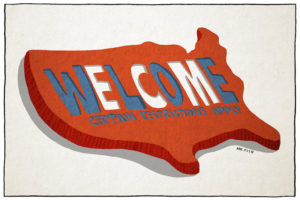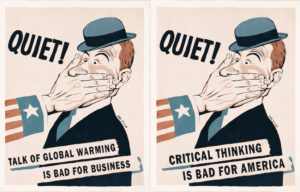American Happiness and the Heebie-Jeebies
Author and documentary filmmaker Ruth Whippman locates the root of American anxiety in “the great national happiness rat race,” a phenomenon that is perhaps nowhere more apparent than in the contrast between British and American culture.
Author and documentary filmmaker Ruth Whippman locates the root of American anxiety in “the great national happiness rat race,” a phenomenon that is perhaps nowhere more apparent than in the contrast between British and American culture.
“Happiness should be serendipitous, a byproduct of a life well lived, and pursuing it in a vacuum doesn’t really work,” writes Whippman, a recent British immigrant to the United States. Since 1972, when researchers first began attempting to measure Americans’ happiness, the scale has registered precious little change. Since that time, about 33 percent of Americans have consistently reported being “very happy.” Rising interests in Eastern meditation, evangelical Christianity, and the “practical” teachings of slick motivational guru and rictus-afflicted multimillionaire Tony Robbins be damned.
Happiness has become the “overachiever’s ultimate trophy,” perpetually beyond the reach of most Americans — at least in the manner in which they appear to imagine it. Not so for the British, who are famously more at home in an atmosphere of cynicism. The alleged prize at the end of an obsessive pursuit for permanent happiness via vague and undefined means has little to do with their historical experience, which reaches much further back in time than the beginning of American society.
“The British are generally uncomfortable around the subject, and as a rule, don’t subscribe to the happy-ever-after,” Whippman writes. “It’s not that we don’t want to be happy, it just seems somehow embarrassing to discuss it, and demeaning to chase it, like calling someone moments after a first date to ask them if they like you.”
— Posted by Alexander Reed Kelly.
Your support matters…Ruth Whippman in The New York Times:
Since moving to the States just shy of a year ago, I have had more conversations about my own happiness than in the whole rest of my life. The subject comes up in the park pushing swings alongside a mother I met moments before, with the man behind the fish counter in the supermarket, with my gym instructor and with our baby sitter, who arrives to put our son to bed armed with pamphlets about a nudist happiness retreat in Northern California. While the British way can be drainingly negative, the American approach to happiness can spur a debilitating anxiety. The initial sense of promise and hope is seductive, but it soon gives way to a nagging slow-burn feeling of inadequacy. Am I happy? Happy enough? As happy as everyone else? Could I be doing more about it? Even basic contentment feels like failure when pitched against capital-H Happiness. The goal is so elusive and hard to define, it’s impossible to pinpoint when it’s even been achieved — a recipe for neurosis.
Independent journalism is under threat and overshadowed by heavily funded mainstream media.
You can help level the playing field. Become a member.
Your tax-deductible contribution keeps us digging beneath the headlines to give you thought-provoking, investigative reporting and analysis that unearths what's really happening- without compromise.
Give today to support our courageous, independent journalists.





You need to be a supporter to comment.
There are currently no responses to this article.
Be the first to respond.